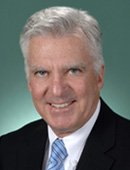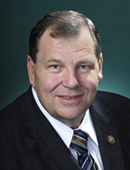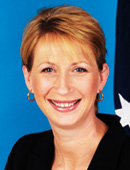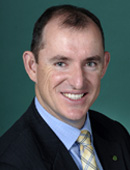|
House debates
Monday, 24 May 2010
Military Superannuation Pensions
Debate resumed, on motion by Mr Oakeshott:
That the House:
(1) should consider increasing the Military Superannuation Pension twice annually by the greatest of either the Consumer Price Index, the Pensioner and Beneficiary Living Cost Index or the Male Total Average Weekly Earnings; and
(2) should do this in recognition of the unique circumstances of military service compared to all others within the public service.
Robert Oakeshott (Lyne, Independent)
I fully recognise the complexities of this issue of military superannuation pensions for the government. There are budgetary issues at play. That is why I am not bringing this into the House as a private member’s bill, and I am sure that is why it has been an issue of contention for various governments over recent decades. I also recognise that there are contextual issues with regard to the full package of veterans entitlements and how that sits alongside a superannuation scheme. It has taken me 18 months to drill through some of the complexities and the details. But I still find myself coming back to the very broad principles that remain unanswered by government, by the Matthews report and by the minister. So those broad principles, in as simple terms as possible, are what I am putting before the House tonight.
I want it be recognised that Defence service is unique within the Public Service. I would hope that most, if not all, members in this place and those who decide on public policy would agree with that basic principle. I hope I do not have to go into detail, but the uniqueness of Defence service lies in defending the nation, our sovereignty and our freedoms. In carrying out their duties of office in the Defence Force, individuals’ safety and lives are endangered, and therefore the circumstances of their families are put at risk. I hope that is broadly accepted by all in this place. If that is true, I would ask all members to consider revisiting the issue of how we treat military superannuation in comparison to all the other types of superannuation and pension schemes that governments support. If you are willing to consider that, there is then a contentious question to answer—and I know that many members have had contact with members of various Defence welfare groups in their electorates. The question is: where do we peg military superannuation and is that fair and equitable for those who have served within our Defence forces?
Currently, military superannuation is indexed by CPI. But the question now is about using ABS quotes about purchasing power and cost-of-living measures, or whether we go right back to what the CPI itself was really designed for, through Professor Pollard in 1973. I would hope it is generally recognised that CPI is not a good indicator for cost-of-living measures and for purchasing power. The question is therefore whether we as policy makers have pegged military superannuation to the most appropriate index possible—and, if not, what are the alternatives? In my view the alternatives that are worthy of consideration are in the form of the age and welfare pensions, which are indexed by the new living cost index, to reflect the failings of CPI in the pensioner and beneficiary living cost index, or the male total average weekly earnings, whichever is the greater. Those are the two options which age and welfare pensions are indexed by. From 1989 to 2008 the age pension rose by 110 per cent, compared to military superannuation pensions, which over the same period rose by 68 per cent—again making that point that CPI is not an appropriate measure of cost-of-living pressures and was never really established for that purpose. I ask the government to therefore consider the motion. (Time expired)
Chris Hayes (Werriwa, Australian Labor Party)
I thank the member for Lyne for bringing this matter on for debate. Let me begin tonight by saying that there is no question that the men and women who have served our country in our military deserve our full support and appreciation. It is a unique job, and our veterans will always be valued in this country. I note that Bob Baldwin and Stuart Robert are in the room. I certainly valued the 10 days that I spent with these guys and others with the servicemen and women at Al-Minhad, which is part of Operation Slipper. I certainly came away, and no doubt all the rest of us did too, with a deep appreciation of the professionalism, dedication and commitment from our young men and women who are serving this country. Clearly, being in the ADF is a unique job.
The one reason when coming to office that we initiated this review is that it was an election commitment. We engaged an independent reviewer, Trevor Matthews, to determine whether there was a case for change from the current arrangements in terms of the calculation of military pensions. It was our election commitment to hold that review. It was conducted at arm’s length from the government, hence it was conducted by Mr Matthews. The result of Matthews’ recommendations was that there be no change to the current method of CPI indexation. He found that CPI at present was the best available mechanism for the purpose of indexing superannuation pensions.
I feel it is important to point out that this motion essentially seeks the military superannuation pensions to be increased in the same way as the age pension. However, in his review Mr Matthews did not consider it unfair that civil and military pensions be indexed on a different basis to the age and service related pensions. In fact, he considered that these are different benefits, providing for different purposes, and he concluded that it is fair that they can be increased on a different basis.
As the Minister for Finance and Deregulation originally noted in the parliament, Mr Matthews drew a distinction between the obligations of state when it came to providing a safety net for its more disadvantaged citizens and the obligations of state as employer to provide a superannuation benefit to its employees and former employees. It is also important that I point out tonight that the government is committed to considering a better indexation method for civilian and military superannuation pensions. Again, that is one of the recommendations that we accepted from the Matthews inquiry. I take the opportunity to encourage veterans associations to work with government to determine the best long-term method for indexing military superannuation pensions.
During a debate of this type, we should also acknowledge the work being done right now to ensure that the Australian Defence Force’s employment package is competitive and attractive. While it is very important, superannuation is but one element of the total employment package of ADF members. The current package is highly competitive and attractive and, as a result, has had a marked improvement in retention and recruitment rates within the ADF. Target incentives are needed to enable us to attract and retain personnel, particularly when the skill sets that they acquire are in such high demand in industry generally. Let there be no doubt that the government is committed to providing a competitive employment package for ADF members, and military superannuation certainly rates very highly.
If one examines the employment packages of ADF members as a whole, they certainly reflect the unique nature of military service. Military superannuation is already accessible after five years, earlier than civilian superannuation, and under the older schemes ADF personnel can access their superannuation benefits after 20 years service, no matter what their age is. Furthermore, the military superannuation scheme is complemented by the military rehabilitation and compensation arrangements, which provide more appropriate compensation and support to members who suffer injury or illness as a result of their service.
Finally, I acknowledge that there will be members of the veterans community in Australia who do not agree with the Matthews report and its recommendations. I would encourage veterans associations to continue to work with government to find an acceptable long-term outcome in the indexing of military pensions to safeguard their interests into the future. (Time expired)
Bob Baldwin (Paterson, Liberal Party, Shadow Minister for Defence Science and Personnel)
The matter of military superannuation indexation is the single biggest issue affecting the veteran community and the most important, according to the vast majority of ex-service organisations. The issue has, in varying forms, existed for at least two decades, yet the most recent manifestation of the issue can be traced back to the promises made by the Rudd Labor government in the lead-up to the 2007 federal election, when they promised:
"To restore the value of compensation and prevent further erosion due to unfair indexation".
The Rudd Labor government has not done that. The Rudd Labor government has not even bothered to respond to the review into military superannuation arrangements, also known as the Podger review, which was publicly released two years and five months ago today. In fact, Minister Tanner, in a media release dated 21 August 2009, completely contradicted that election promise when he said:
"… we are satisfied that the CPI is the most suitable index to protect Australian Government superannuation pensions against inflationary price increases available at this time."
This government unashamedly lied to all veterans at the last federal election. Veterans have every right to feel betrayed by this Rudd Labor government—a government that at the last federal election promised so much but has since delivered so little, a government that has wasted taxpayers’ money through poorly targeted spending programs and a government that continues to tax and spend, all the while wilfully neglecting the veteran community. Veterans have every right to be disappointed and disillusioned with the Rudd Labor government.
I want to make it perfectly clear that I and the coalition have always considered and will always consider service rendered by our military personnel as unique. Although I have not served in the ADF, I have had many opportunities to experience the many facets of service life through, for example, my work as the shadow minister for defence science and personnel, through my participation in the ADF parliamentary program and most recently by spending a week with Australian troops on the ground in Afghanistan with my colleague Stuart Robert. I would argue that one need not have served in the military to understand the unique nature of service. To those that think otherwise, I would simply suggest they talk to the spouse, mother, father or child of a current serving member. They will, I have no doubt, convey to you the uniqueness of their relative’s service. One of the finest summations of the uniqueness of military service I have read to date comes from David Jamison, the President of the Defence Force Welfare Association, who said:
In volunteering for military service, the individual accepts the surrender of his or her basic rights under Article 3 and places his or her life, liberty and security of person in the hands of the State. This surrender is not unconditional, though in extremis, it is absolute.
The coalition truly appreciates the unique nature of military service, which is why we continue to oppose the Governance of Australian Government Superannuation Schemes Bill 2010 in its current form, for it will further blur the distinction between military and non-military service. The indexation of military superannuation is a very complex issue. While I am of the view that the proposal to index military superannuation more fairly has merit, the cost of such charges remains substantial. It is worth noting, however, that at the time the Podger review was tabled, this government had a $23 billion surplus. That was the time for the Rudd Labor government to take action, as promised. Now, however, the task at hand is much harder given that the Rudd Labor government has incurred debts of $93.7 billion. But it is pursuable in the longer term.
Labor’s 2007 election policy document said that a Rudd Labor government would ‘maintain a generous military superannuation system in recognition of the importance of the ADF and the immense responsibility placed on personnel in securing and defending Australia’. Of course, those in the veteran community know that the Rudd Labor government took them for a ride. They know that they were used purely for political reasons, and they know that they can no longer trust the Rudd Labor government.
To conclude, I want to assure the veteran community that the coalition remains committed to introducing a fair, equitable, financially responsible military superannuation system and that we will pursue these reforms when in government. We will bring the nation’s accounts into line so that any measures we enact are affordable and sustainable.
Shayne Neumann (Blair, Australian Labor Party)
In my electorate of Blair in South-East Queensland we have many fine organisations of military and returned service personnel—Leagues clubs et cetera. There are many fine people; it is a place where people purchase homes and retire after serving at the RAAF base at Amberley. We honour those military people who have served overseas as well as at the RAAF base at Amberley and at other places throughout Australia. We want to make it plain to them that we support them, and that is why we have done many things to make their lives easier.
In my electorate, for a start, we have Defence housing of a quality that was never seen under the previous coalition government. This weekend, in fact, I am opening some Defence houses in Ipswich. We have provided the Defence Home Ownership Assistance Scheme, which was rolled out on 1 July 2008, helping ADF members and their families to achieve home ownership in a way that the previous government never did. I heard the member for Paterson going on about what they have done. You would wonder what they did in all those years—the Howard years. What would you believe of the vague and obtuse references they made? We made commitments to the veteran community at the last election, and we fulfilled that by undertaking the review.
Mr Baldwin (Paterson, Liberal Party) interjecting—
Sharon Bird (Cunningham, Australian Labor Party)
If people want to ask questions, there are forms. Member for Paterson, if you want to ask a question, there is a form.
Shayne Neumann (Blair, Australian Labor Party)
We engaged Mr Matthews, an international leader in the global pensions and life insurance industry—an Australian citizen, Past President of the Institute of Actuaries of Australia and currently a prominent actuary in the United Kingdom; he was eminently qualified to carry out the review. We have heard this feigned moral unction from those opposite in relation to this issue, and you heard the comment of the Leader of the Opposition in April this year. Why would you believe a word he said when he served in the cabinet of the Howard government all those years? You only have to hear what he said about this. We engaged Mr Matthews to undertake the review, and he undertook it. He looked at schemes throughout the world. In fact, the review went on to look at military pensions in Canada, South Africa, the United States and the United Kingdom, all indexed to increases in the consumer price index in those countries. In at least two cases—the United States and South Africa—the relevant pensions were increased annually by less than increases in the local version. He looked at this in detail. His recommendations were that pensions from the Australian government civilian and military superannuation schemes continue to be indexed against the effects of inflationary price increases. The same indexation methodology would continue in relation to civilian and military pensions.
Pensions from the Australian government civilian and military superannuation schemes continue to be indexed to CPI. This is the most suitable index, according to Mr Matthews. If there is a more robust index, he said in recommendation number 4, that justifies a change in the scheme, the government should look at that in the future. I heard what the member for Werriwa had to say about the issue. If the veteran community want to have some discussion about that and want to keep advocating for their position, in a democracy they are entitled to that. I want to thank the veteran community for what they have done in relation to their service. We have made it plain that we will listen to the veteran community. We have acted on what we said, and that was to have a review. We have done that.
The member for Paterson talked about Podger. The government committed in 2007 to make public the Podger review into military superannuation. The coalition refused to release it. We have done so and the government is considering it. They refused to release it at all. The government also committed in 2007 to the independent review. We have held that. We have a strong record in this area, going back to the Hawke government, which established the Military Superannuation Benefits Scheme in 1991, recognising that the previous schemes had served many members poorly. The Labor government did that back in those days. The Rudd government has acted on it now. Superannuation is one aspect of the total remuneration package available to ADF members. We have made that clear and we have acted on that.
With respect to the Matthews findings, we have acted on the basis that the most appropriate purpose of indexing an occupational superannuation pension is to protect the purchasing power of those pensions from the effects of price inflation. And that is what happens overseas. That is exactly what happens in the OECD and the countries that I listed before. That is the reality. We followed the independent advice of Mr Matthews, which was the appropriate thing in the circumstances to do.
Rodney Ross: Why on earth doesn't this man advocate using CPI to adjust Parliamentary pensions??
Stuart Robert (Fadden, Liberal Party, Shadow Parliamentary Secretary for Defence)
I rise to make comment on the motion put forward by the member for Lyne. It is instructive that I mention that I am here with my parliamentary colleagues Bob Baldwin, the member for Paterson and the shadow minister for defence, science and personnel, and Louise Markus, the member for Greenway and the shadow minister for veterans’ affairs. The shadow minister for defence, Senator David Johnston, would have like to be here, but he is in Darwin. Tonight when we speak on this motion we have three out of four of the shadow defence team here. The entire team would have been here to discuss the gravity of this motion but for pressing matters that have driven the shadow minister to Darwin.
We are here gathered, three of the four shadow ministers, because we understand the unique nature of service that is the military. We understand the hardships, the deprivations and the toughness. We understand the difficulty of being away from families and friends and of being separated from loved ones. I speak from personal experience, having served as a military officer for 12 years and having served overseas in operations. And I speak from some recent experience, with my colleague the member for Paterson and I having just returned from 10 days in the Middle East area of operations and just short of a week in Afghanistan proper.
We understand the compact that government has with our defence and veteran community. This compact says that we will put you in harms way and put you in places of great difficulty where life and death is the order of the day. We will put you there to further the diplomatic and national interests of our nation and to safeguard and to protect our nation. We do it knowing full well that this nation has a responsibility to you during your service and post service. We understand and accept this responsibility keenly.
We also note that the Matthews report, when released by the government, recommended that indexation arrangements stay the same. The government, not surprisingly, grasped that and did nothing. What is so personally disappointing for all of us here on the coalition side is that in opposition the current Minister for Veteran’s Affairs, Minister Griffin, said that the government should clarify the military superannuation situation immediately, as the morale of current members is being seriously affected. Well, the government has clarified it. It has said that this compact is not well regarded and that they will do nothing.
Before the election, a number of people on the Labor side made comments to say that they would index the pension to 25 per cent MTAWE. I am even led to believe that Mr Rudd, the Prime Minister, may have made such comments. If so, this is one more broken promise in the conga line of broken promises that so typifies this government. Once again, the Rudd government has demonstrated its unwavering commitment to spin when it should have demonstrated a commitment to addressing the military superannuation system and honouring the compact we have with the men and women who go in harm’s way. Now the Rudd government is retaining the current indexation. And with the government currently borrowing a hundred million dollars a day—$700 million a week and over $40 billion this year alone—with gross debt exceeding $130 billion and with net debt just under $100 billion, it has neither the means, the capacity nor the political courage to address the situation.
We appreciate the unique aspects of service. We appreciate the need to provide certainty and security for those who have contributed so much to our nation. In simple terms: the coalition gets it. We have promised and our leader has made the point that we will return when the budget is in surplus—(Time expired)
Anna Burke (Chisholm, Deputy-Speaker)
Order! The time allotted for the debate has expired. The debate is adjourned and the resumption of the debate will be made an order of the day for the next sitting.
|






